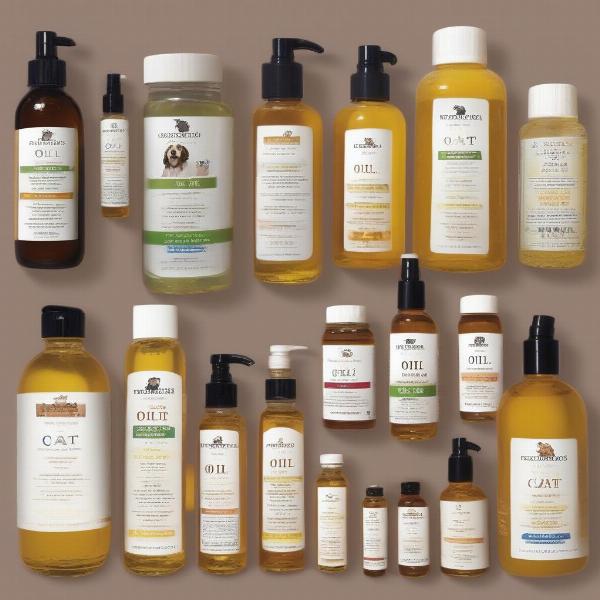Skin and coat oil can be a valuable addition to your dog’s grooming routine, contributing to a healthy, shiny coat and relieving dry, itchy skin. Choosing the right oil and using it correctly is key to maximizing its benefits. This guide explores the various aspects of using skin and coat oil for dogs, from selecting the best product to understanding potential side effects.
Choosing the Right Skin and Coat Oil for Your Dog
With numerous skin and coat oils available, selecting the right one can be overwhelming. Consider your dog’s breed, age, skin condition, and any allergies they may have. Common oils include fish oil, coconut oil, flaxseed oil, and hemp oil, each offering unique benefits. Fish oil, rich in omega-3 fatty acids, is excellent for reducing inflammation and promoting a glossy coat. Coconut oil can soothe dry skin and prevent infections. Flaxseed oil, another source of omega-3s, improves coat health and reduces shedding. Hemp oil, rich in omega-6 fatty acids, can also help with inflammation and dry skin.
 Choosing the Right Skin and Coat Oil for Dogs
Choosing the Right Skin and Coat Oil for Dogs
Always consult your veterinarian before adding any new supplements to your dog’s diet, especially if they have pre-existing health conditions. They can recommend the best oil and dosage based on your dog’s specific needs.
Applying Skin and Coat Oil: A Step-by-Step Guide
Applying skin and coat oil is straightforward. First, bathe your dog using a gentle shampoo like tar shampoo for dogs. Towel dry their fur, leaving it slightly damp. Then, pour a small amount of oil into your palm and rub your hands together. Gently massage the oil into your dog’s coat, working from the roots to the tips. Be careful around the eyes and nose. For smaller dogs, a few drops are sufficient, while larger breeds may require a larger amount.
Benefits of Using Skin and Coat Oil for Dogs
Skin and coat oil offers numerous benefits, including:
- Reduced shedding: Regular application can minimize shedding by nourishing the hair follicles and promoting healthy skin.
- Relief from dry, itchy skin: The moisturizing properties of these oils can alleviate discomfort caused by dry skin, allergies, or environmental factors.
- Improved coat health: Skin and coat oil can enhance the shine, softness, and overall appearance of your dog’s fur.
- Reduced inflammation: Certain oils, such as fish oil and hemp oil, possess anti-inflammatory properties that can benefit dogs with skin conditions like eczema or allergies.
Addressing Common Concerns and Potential Side Effects
While skin and coat oil is generally safe, some dogs might experience mild side effects like greasy fur or an upset stomach, especially if ingested. Start with a small amount and monitor your dog for any adverse reactions. Choose high-quality oils specifically formulated for dogs to minimize the risk of allergies or irritations. If you notice excessive itching, redness, or other unusual symptoms, discontinue use and consult your veterinarian. You can also try using bath gloves for dogs to ensure even distribution and reduce excess oil.
How Often Should I Apply Skin and Coat Oil to My Dog?
The frequency of application depends on your dog’s individual needs. For dogs with dry skin, applying oil once or twice a week might be beneficial. If you’re primarily using the oil to enhance coat shine, once a month might suffice. Regular brushing with a curry comb dog can further distribute the oil and remove loose hair. It’s also essential to address any underlying dietary deficiencies that might contribute to dry skin or a dull coat. Adding flax for dogs to their diet can also contribute to healthy skin and coat.
Conclusion
Skin and coat oil can be a valuable tool for maintaining your dog’s skin and coat health. By choosing the right oil and following the proper application techniques, you can help your furry friend achieve a healthy, shiny coat and alleviate dry, itchy skin. Always remember to consult your veterinarian before introducing any new supplements to your dog’s routine. They can provide personalized recommendations and ensure the safety and efficacy of the chosen oil.
FAQ
- Can I use human skin oil on my dog? No, human skin oils are formulated for human skin and may contain ingredients that are harmful to dogs.
- What are the signs of an allergic reaction to skin and coat oil? Signs include excessive itching, redness, swelling, and hives.
- Can I apply skin and coat oil to a dog with open wounds? No, avoid applying oil to open wounds. Consult your vet for appropriate treatment.
- Is it normal for my dog’s fur to feel slightly greasy after applying oil? Yes, a slight greasy feeling is normal, especially immediately after application.
- Can skin and coat oil help with my dog’s allergies? Certain oils, like fish oil and hemp oil, can help reduce inflammation associated with allergies, but it’s crucial to consult your vet for diagnosis and treatment.
- Can I use skin and coat oil on puppies? Yes, but consult your veterinarian for recommendations on safe oils and appropriate dosages for puppies.
- My dog keeps licking the oil off; what should I do? Try distracting your dog with a toy or activity after application. You can also try using a bitter-tasting spray designed to deter licking.
You might also like: how do i help my dog with dry skin
ILM Dog is a leading international dog website dedicated to providing expert advice on all aspects of dog care, from breed selection and health to training and nutrition. We strive to empower dog owners with the knowledge and resources they need to provide the best possible care for their canine companions. Whether you’re a seasoned dog owner or just starting your journey, ILM Dog has the information you need. For further inquiries or personalized advice, reach out to our team at [email protected] or call us at +44 20-3965-8624. Visit ILM Dog today for expert guidance on all your dog-related needs.